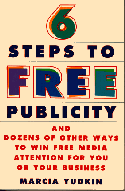

FIVE WAYS TO BE TIMELY
Sometimes it takes imagination to articulate a mediaworthy answer to this question. Writer Calvin Trillin dubbed himself "America's Highest Paid Poet," and the press ate it up. He came up with that title after he discovered that poets often get paid per line. At The Nation, however, he earns $100 per poem. When he wrote a two-line poem, he figured he'd earned $50 per line, more than poets get from The New Yorker or anywhere else. What can you say about your business that competitors can't?
You may also want to create a sideline service or product that comes across as distinctive. Then when the press publicizes that, your usual line of business gets a boost too. In 1990 a friend and I started a writing seminar business and thought about how to get publicity. We concocted a 900-number giving five-minute lessons on business writing and sent out a press release to announce it. That got us onto page one of the Wall Street Journal -- above the fold. Did that help us convince companies to hire us to present seminars? It sure did.
Since an event happens at a specific time and place, it gives the media more reason to cover you than if you try to publicize an ongoing service or product. A psychotherapist looking for clients arranged to give a free lecture at a nearby public library on eating disorders, her topic of specialization. She sent a press release about the lecture to the papers for four neighboring towns, and two of the four printed photographs and long feature stories about her work. If you own a computer store, you can offer computer classes for kids or a fix-your-own-computer clinic.
When an earthquake rattles Columbus, Ohio, that's the perfect time if you sell insurance to release a set of tips on making sure you're covered for disasters. If Congress is debating an international trade treaty, tell the press how the treaty would have impact on your export business. News includes what's happening in the entertainment world. The summer that "Jurassic Park" set box-office records, the media publicized any dinosaur-related business they could find.
Controversy gets you attention. If most sales representatives would never visit a prospect without a briefcase bulging with brochures, claiming that that's precisely the wrong thing to do -- so long as you can argue for it effectively -- will pique the interest of the media. When 1993 turned into 1994, I got into the Boston Herald and onto Fox 25 News for putting out the word that many people would be better off NOT making New Year's Resolutions.